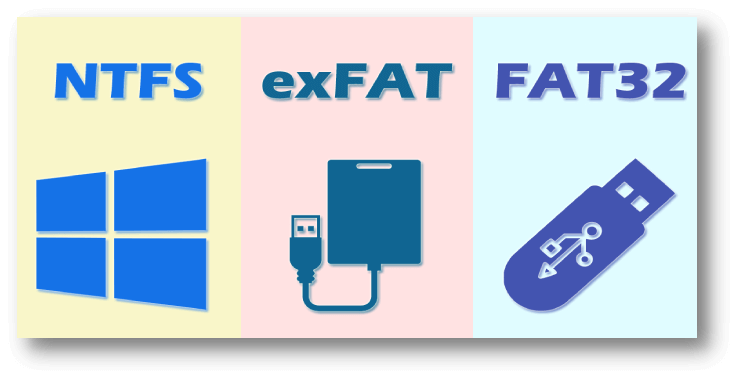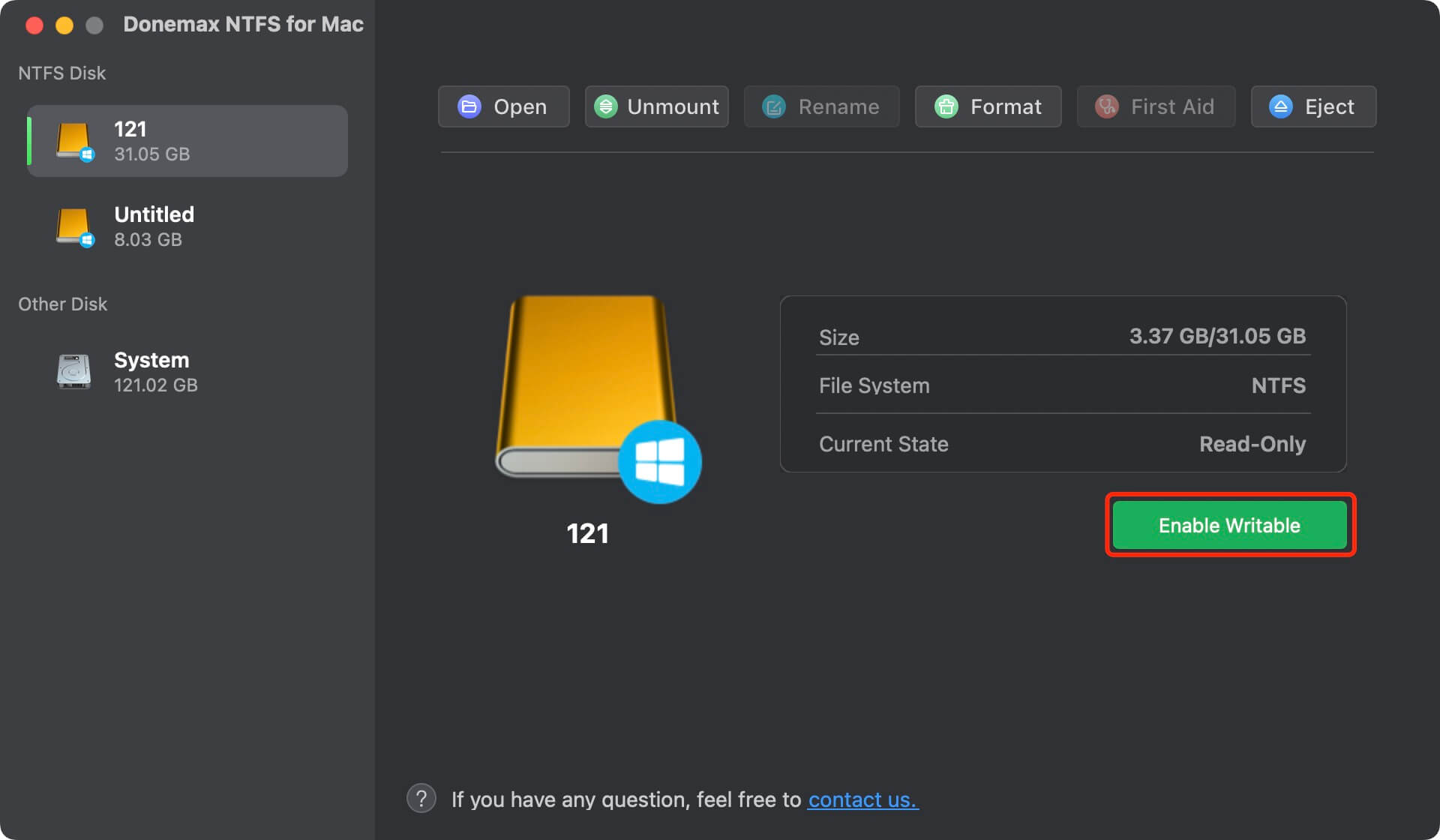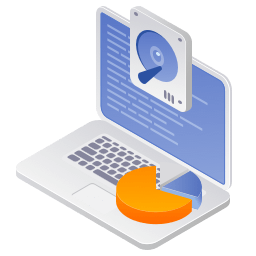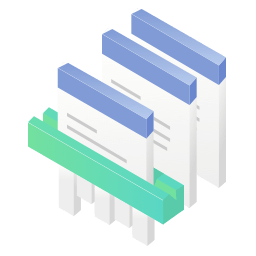PAGE CONTENT:
When we save things on a computer, they need a place to stay organized. Things are put together with something called a "file system." You can think of it as a big library with shelves where books (files) are kept in a certain order. There are three main types of file systems: NTFS, FAT32, and ExFAT. It's easy to use and works with many devices, like a simple library.
FAT32 is different, such as it can't hold large files. NTFS is the most advanced. It's like a high-tech library with extra protection and room for big files. If we know about these file systems, we can pick the best one for our needs, whether it's to store family photos, school projects, or data from a large company. Let us learn more about what makes each of these file systems unique.

FAT32 vs NTFS vs ExFAT
FAT32 (File Allocation Table 32):
FAT32 is an addition to the original FAT file system, which came out in the late 1970s. It became famous because it is easy to use and works with many operating systems. Here are some of the most important things about FAT32:
- Compatibility: Many operating systems, such as Windows, macOS, and Linux, work with FAT32. It is also compatible with many devices, making it a good choice for USB flash drives and memory cards.
- File Size Limitations: One of the biggest problems with FAT32 is that files can only be a certain size. Individual files can be up to 4 GB, so it's not good for keeping big files like HD videos or disk images.
- Storage Capacity: FAT32 can handle 2 terabytes (TB) of space, so it can be used on smaller storage devices. However, if you need more storage space, FAT32 might not be the best option because it has trouble handling large amounts of data.
NTFS (New Technology File System):
Microsoft made NTFS as a replacement for the FAT file system. It has many more features and is better than its predecessors. It is the file system that comes with current Windows operating systems and makes them safer, more reliable, and faster. Now, let's look at some of the most important parts of NTFS:
- File size and volume limitations: FAT32 has some limitations, but NTFS makes up for them by allowing much larger file sizes and storage volumes. Individual files can be up to 16 exabytes (EB), and volumes can be up to 256 terabytes (TB). That means it can be used with high-capacity storage devices and enterprise-level systems.
- Security and Permissions: Access control lists (ACLs), encryption, and file and folder rights are some of the advanced security features of NTFS. These features let administrators limit who can see private data, make data more secure, and make sure that rules are followed.
- Reliability and Fault Tolerance: NTFS has features for recovering lost files and fixing mistakes, which makes it more reliable and tolerant of errors. Journaling and transactional NTFS (TxF) are features that help keep data safe in case the system crashes or the power goes out.

ExFAT (Extended File Allocation Table):
The features of NTFS are more advanced than those of FAT32, but ExFAT is somewhere in the middle. Microsoft made it to get around the problems with FAT32, especially when it comes to file size and storage space. Let us look at what ExFAT is and how it works:
- Improved File Size and Storage Limits: ExFAT fixes FAT32's problems with file sizes and storage volumes by letting files be up to 16 exabytes (EB) in size and storage volumes up to 128 petabytes (PB). Because of this, it can store big files and manage large storage devices like SSDs and external hard drives.
- Compatibility: Like FAT32, ExFAT works with many operating systems, such as Windows, macOS, and Linux. Because it is compatible with so many things, it is often used for memory cards, portable hard drives, and other removable media.
- Lack of Advanced Features: While ExFAT has bigger file sizes and more storage space than FAT32, it doesn't have as many advanced features as NTFS, like file rights, encryption, and journaling. Because of this, it might not be the best choice for apps that need higher levels of security or dependability.

Choosing Your Champion: A Round-Up
This short list will help you choose the best file system for your needs:
Use FAT32 if:
You care most about compatibility and store mostly papers, music, and photos (less than 4GB). It works great for flash drives that can be used on many devices.
Use exFAT if:
You must store big files (over 4GB) and ensure they work well with current operating systems. External hard drives can be used with many different gadgets.
Use NTFS if:
It is very important to have security and advanced features like encryption and file rights. NTFS is the best choice for your internal hard drive, where Windows is installed.
Beyond the Basics
The main points of FAT32, exFAT, and NTFS are discussed in this text. But there's more to look into. Here are some more things to think about:
- Performance: The changes aren't very noticeable for normal use, but tests show that FAT32 might work better with flash drives because it's easier to set up. But for most users, there isn't much of a change in performance between exFAT and NTFS.
- Fragmentation: Files can become broken over time, slowing things down. NTFSNTFS is better for fighting splitting than FAT32 or exFAT.
- Disk Health: NTFS has tools like chkdsk to check for and fix disk problems. Some third-party tools exist for FAT32 and exFAT, but NTFS is the best way to keep your internal storage drive's disk healthy.
Note: NTFS is not compatible with macOS. If you want to use a NTFS drive on your Mac, just download and install a NTFS for Mac tool - such as Donemax NTFS for Mac tool to help you enable writable for the NTFS drive.

The Future of File Systems
File systems also change over time. There are new competitors, like Microsoft's next-generation file system, ReFS (Resilient File System), which is intended to be more scalable and more tolerant of errors for future storage needs. For most people, though, FAT32, exFAT, and NTFS are still the best options in 2025.
Conclusion:
In conclusion, the choice between ExFAT, FAT32, and NTFS relies on several things, such as the need for advanced features like security, reliability, and compatibility. Even though it limits file size and storage space, FAT32 is still a good choice for basic storage needs and support with older systems.
NTFS is good for current Windows environments and enterprise-level systems because it has more advanced and reliable features. In contrast, ExFAT finds a good balance between speed and compatibility, which makes it ideal for storing big files on external drives. Knowing the pros and cons of each file system is important for picking the best one for your needs.
And with disk formatting too, you can easily format NTFS drive to ExFAT, or format ExFAT drive to NTFS, etc.
Related Articles
- Nov 16, 2024Can I Use a Mac Without Login Password?
- Dec 09, 2024How to Use a Digital Camera on Mac: A Comprehensive Guide?
- Jan 21, 2025HDD vs. SSD: A Detailed Comparison
- Nov 13, 2024About Apple Silicon M4 Chips: Everything You Should Know
- Oct 24, 2024Safari vs. Chrome on Mac: A Comprehensive Comparison
- Apr 02, 20242025 Best 6 Disk Utility Alternatives for Mac

Lucien
Lucien is a writer and a chief programmer of Donemax software who has worked in the company for 5+ years. He has written much of the content on the site and devotes to providing troubleshooting and solution for Windows and Mac users including disk cloning, data recovery, migration, eraser, error fixes.

Gerhard Chou
In order to effectively solve the problems for our customers, every article and troubleshooting solution published on our website has been strictly tested and practiced. Our editors love researching and using computers and testing software, and are willing to help computer users with their problems
Hot Donemax Products

Clone hard drive with advanced clone technology or create bootable clone for Windows/Mac OS.

Completely and easily recover deleted, formatted, hidden or lost files from hard drive and external storage device.

Certified data erasure software - permanently erase data before selling or donating your disk or any digital device.